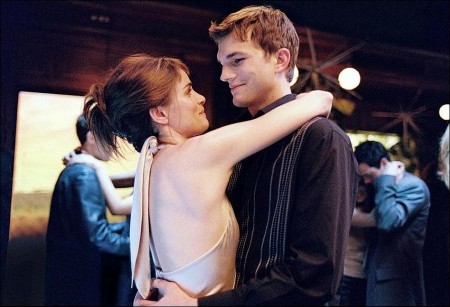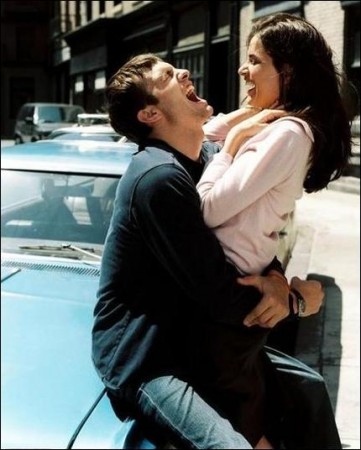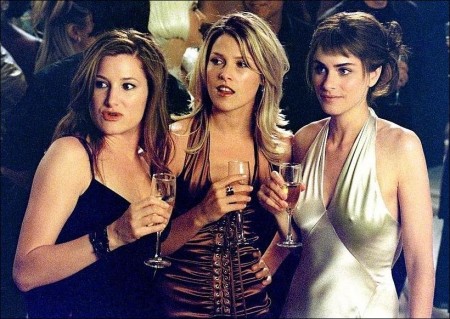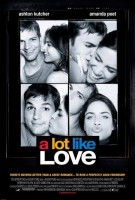Tagline: There’s nothing better than a great romance… to ruin a perfectly good friendship.
A romantic comedy about romantic obstacles, A Lot Like Love takes a fresh, sophisticated and entirely modern look at falling in love. Ashton Kutcher and Amanda Peet star as a pair of dynamic, diametrically opposed twentysomethings — Oliver and Emily –whose initial fateful meeting sets off sparks… then seems to go nowhere. Over the next seven years, they will continue to meet. But is their relationship simply a good friendship? Is it destined to be yet another romantic disaster? Or is what they have between them something A LOT LIKE LOVE?
British director Nigel Cole — whose debut films “Saving Grace” and “Calendar Girls” became sleeper hits – brings to life the screenplay written by Colin Patrick Lynch, a Los Angeles based actor/playwright. The result is a unique twist on the romantic comedy, unfolding in an era of uncertainty and mobility that keeps young lovers questioning their every move.
It all begins as a young man and woman meet on a cross-country flight. Oliver (Kutcher) is a brand new college graduate with an airtight timeline for attaining his dreams of both business success and finding true love. Emily (Peet) is a bold free spirit drawn to spontaneity and wild extremes. wo different choices, two incompatible views on life. They may have hooked up for a brief moment, but Oliver and Emily clearly don’t belong together. Or do they?
Though they both move on, Oliver and Emily nevertheless can’t quite seem to completely let go. As the two bump into each other, year after year, in city after city, through changing careers and different relationships, there always seems to be plenty keeping them apart. And yet, there’s also something utterly inexplicable pulling them together. There’s something about the way they laugh together, they way they can talk to each other, the way they always seem to be there for one another when things are falling apart. So what keeps getting in the way of what could be romantic destiny? As Oliver and Emily set off on their own individual paths, a LOT LIKE LOVE moves across New York, Los Angeles and San Francisco — and down the hilariously meandering road of modern love.
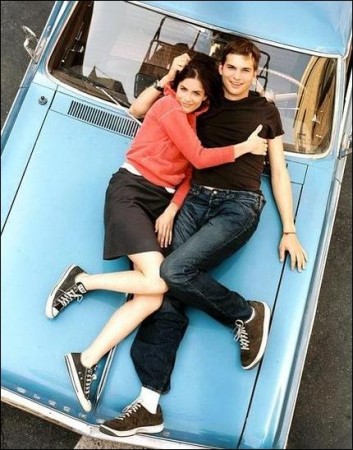
Finding LOVE: About the Origins of the Film
Love in the 21st century is rarely straightforward. On the contrary, it tends to be messy, complicated and filled with comical obstructions and impediments that sometimes make it a wonder that it happens at all. Screenwriter Colin Patrick Lynch wrote a romantic comedy that reflects the long and winding road that so many people must careen down to find connection in today’s chaotic world.
Lynch follows Oliver and Emily over a seven year period – from young adulthood to the cusp of their 30s — constantly moving from place to place, shifting careers, changing partners and even re-defining their dreams as they begin to figure out what life is really about. All the while, they are each searching for true love – searching everywhere that is except the one place they might find it: standing right in front of them again and again in the form of an old friend.
Lynch, a Los Angeles based playwright who had yet to have a feature film produced, turned to an old college friend, producer Kevin Messick, who read his script and fell in love with it. “I thought Colin’s script had such a realistic way of tackling the chaos and messiness of contemporary relationships,” he says. Messick was determined to get Lynch’s debut project off the ground.
When director Nigel Cole read the screenplay he was quickly seduced. Cole saw the story as an opportunity to take a fresh look at the traditional screwball romance – focusing on how two people finally come together in a world that seems to keep yanking them in opposite directions.
“I had been looking for a romantic comedy to do for ages, and I was almost despairing until I was sent this script,” recalls Cole. “What excited me about it is that it reminded me of the great old-fashioned romantic comedies I’ve always been enamored with, but it had a very contemporary sensibility. I like that it’s a tale about real people you recognize in a real type of love that is as blind, unpredictable and out of control as real love, much to our chagrin, almost always is.”
A rising new talent in mainstream comedy, Cole had already had directed two back-to-back sleeper hit comedies about middle-aged women breaking out of their molds – “Saving Grace” in which Brenda Blethyn plays a woman who unwittingly becomes involved in the cannabis business; and “Calendar Girls” about a group of women who make the bold decision to pose nude for charity. Now, Cole himself was ready to break out and do something new.
He continues: “A LOT LIKE LOVE is quite unusual because most romantic comedies are structured so that they essentially spend two hours building to a kiss and end with the very start of a relationship. This one starts right away with a kiss and then the fun of the story comes in the surprising developments that come after that when these potential lovers don’t come together. It’s really a story of bad timing – Oliver and Emily keep meeting over and over but it’s always the wrong moment for them to fall in love for one reason or another. It begs the question of what happens when a chance encounter doesn’t lead to the people involved taking a chance, which seemed like a wonderful starting point.’”
Cole came to Los Angeles and met with producer Kevin Messick and writer Colin Patrick Lynch and the three agreed to work together to get the film made. Now, with Cole on board, Messick was able to take the script to Armyan Bernstein at Beacon Pictures – who was also won over by the romantic comedy’s blind-to-romance charms.
“From the minute we started reading the script, we loved the premise,” says Bernstein. “It was funny, enchanting and seemed very relevant to today’s audiences. We were also thrilled to find out Nigel Cole would be involved. He has shown himself to be very talented and I think his uniquely elegant sense of style really suits this material.”
Adds co-producer Lisa Bruce: “Another thing we loved is the realism of the story and its style. You often see romantic comedies with this very clever banter that doesn’t have a whole lot to do with the way people truly talk. Oliver and Emily are definitely witty and playful with each other but they speak the way real people speak. I think you really relate to them as these great friends who like hanging out together but aren’t quite sure how their lives are supposed to intertwine. There’s an exciting sense of watching real, ordinary people struggle to figure out if they’re in love.”
Bruce summarizes: “The process of falling in love and falling out of love and falling back in love is definitely a timeless Hollywood theme. But the way the characters go through this age-old dance in A LOT LIKE LOVE is very fresh.”
Being LOVE: Casting Ashton Kutcher and Amanda Peet
As A LOT LIKE LOVE began to swing into high gear, it was obvious that the core of the entire project would lie in the casting. The story would require finding a pair of actors able to embody a couple as energetic, fun-loving and ultimately flummoxed by one another as Emily and Oliver.
“There is really only one key to all romantic comedies — and that is chemistry,” explains director Nigel Cole. “So from the beginning the most important focus for everyone involved in A LOT LIKE LOVE was to find an actor and an actress who could bring to life the very specific chemistry between Oliver and Emily with both humor and realism.”
The filmmakers dove into a concerted search for the duo, searching for two stars who could highlight Oliver and Emily’s odd-couple contrasts — from his cool and collected business ambitions to her wild and crazy desires to live a life of rebellion and creativity.
Quite suddenly, what seemed like an overwhelming process came to an end when the filmmakers saw rising stars Ashton Kutcher and Amanda Peet read together. The room was instantly charged by their comic repartee and easy way of bouncing off of one another.
“Within about five seconds of watching Ashton and Amanda we simply knew,” remembers Cole. “There was just something about them – they way they made each other laugh, the way they seemed to understand one another on an instinctual level. Right from the start, they really embodied both the connection and the friction between Oliver and Emily that makes them perfect romantic foils. And if you’ve got that magic in a romantic comedy, you’re already half way there.”
Adds producer Armyan Bernstein: “Ashton has a wonderful ability to be charming and appealing at the same time as being self-deprecating. I don’t want to overstate it, but there are times when he has that Cary Grant quality. Amanda was also always surprising us with the honesty and humanity she brought to her character. Together, they were able to bring to the story weight and dignity as well as a lot of light-hearted fun and joy.”
For Ashton Kutcher, one of today’s most popular comedic and dramatic screen stars, the film’s unusual love story was an immediate draw. “It’s a story about how sometimes great things happen in the most illogical of ways and at completely the wrong time. And since life is really like that, the script really struck me when I read it,” he explains. “I like that it asks the question: what is it that makes two people click or not click when they meet each other?”
Yet, Kutcher also saw the story as being about more than just the fuzzy line between two people staying casual friends or diving into happily ever after. “I really see it as being about two people trying to grow up as best as they can in a world where you can’t grow up fast enough. To me, it’s very much about the way people live their lives today,” he says.
Kutcher also developed a deep affinity for Oliver, who he thinks is typical of many young college graduates who are chomping at the bit to create the life of their dreams. Oliver starts out with a concrete plan for everything in his life – and isn’t willing to budge from his blueprint when he meets someone like Emily, who just doesn’t fit in the scheme.
“When we first meet Oliver, he’s at a point where he’s got his degree and he’s facing this classic question we all face of `now what?’ He’s waiting for the world to come to him,” Kutcher observes. “He has this idealistic scenario that first you get the job, then you get the career, then the house and finally the girl – and that’s the way you obtain the American Dream. He’s very conservative and cautious But then he meets Emily, who is really the opposite of him in every way. She lives in the moment and she is very much about moving in the fast lane and having a great time. So there’s definitely an attraction there but they also really push one another’s buttons. I liked that you could always see things going either way for the two of them.
Though he always liked the script, it was the audition with Amanda Peet that sealed the deal for Kutcher. “It was really because of her that I wanted to do this movie so strongly,” he explains. “When she came in and read with me, it was like `okay, now we have to do this.’ I found that Amanda has great comedic timing, but she’s also not afraid to be human, and that makes her wonderful as Emily. I felt really fortunate to work with her.”
In one of Kutcher’s most vulnerable and comic scenes, he rushes to Emily’s Los Angeles apartment hoping to serenade with her a Bon Jovi song. Though Kutcher can both sing and play guitar, Nigel Cole implored him to do the kind of semi-competent job that the tightly wound Oliver was likely to do in trying to be a spontaneous romantic.
“I realized that I couldn’t even practice singing the song or it would be too polished,” says Kutcher. “I just had to let it happen in the moment.”
Comments Cole: “Ashton brought a great deal of heart and passion to that moment so that you really feel for Oliver. Despite being a very good singer, he was able to hit quite a few really bad notes. I thought he did it brilliantly. He found exactly the right tone, riding that wonderful line between being funny and being truly poignant.”
For her part, Peet was inspired to play Emily because she found the character – who starts out as a spunky punk rocker only to discover a different path — so true to life. “She reminded me of people I knew back in college; you know, those girls who wore all black and had this sort of angry edge to them and were very concerned with being cool,” explains Peet. “And it was really interesting to me that this kind of girl would meet someone like Ashton’s character who is so strait-laced and normal, and not really know how to handle their connection.”
Peet adds: “I guess the script got me interested because it’s definitely not your run-of-the-mill romantic comedy. It reminded me of a `When Harry Met Sally’ for this generation.”
Like Kutcher, Peet became even more inspired by their on-screen chemistry together. “Ashton and I naturally have this great sort of contentious repartee with one another,” she observes. “Of course, it’s hard for me to imagine how anyone could not fall in love with Ashton. He’s so winsome and sparkly and magnetic. I have to keep reminding myself that Emily isn’t that won over by him – that she just doesn’t see him as fitting with who she is in life.”
She continues: “I think we both felt we had a wonderful opportunity with these roles to really show the different stages of love, from resistance to friendship to lights-out romance. Right from the start we had such a great time with the opening scenes where Emily and Oliver can’t stand each other and yet… they can’t seem to stop talking to one another and engaging with each other. We’ve all been through something like that.”
Also winning Amanda Peet over was Nigel Cole. “I’m just mad about Nigel,” she says. “He has an incredible sense of what’s funny but also manages to make the film feel really romantic. I feel like Nigel’s making movies that are very different from other movies you see right now. It’s not that his films aren’t edgy, because I think they are, but there’s something very human and charming about his style that is so wonderful and unique.”
With Kutcher and Peet cast, the filmmaker begin to fill in the supporting characters who wind in and out of Oliver and Emily’s lives through the seven-year span of the story. One of Oliver’s closest confidantes throughout is his brother Graham, who happens to be deaf and communicates with Oliver in sign language. To portray the role authentically, deaf actor Tyrone “Ty” Giordano was cast – on the heels of starring on Broadway as Huck Finn in the revival of “Big River.”
“Everyone was raving to me about what a great actor Ty was and from the minute he was on the set I realized they were right,” notes Nigel Cole. “He also turned out to be a really lovely guy – helpful, smart and sensitive – and he and Ashton hit it off right away so that there was this authentic sense of them being brothers.”
Giordano loved that the focus of the character is fully on his relationship with Oliver – and that his Graham’s deafness never even comes up as a topic of conversation. “Graham is a character who just happens to be deaf but it’s not what his character is about, which is great,” says the actor. “I loved the script because when I read it, the interaction between Oliver and Graham reminded me exactly of how me and my brother relate.”
To keep up with Giordano, Ashton Kutcher spent several months learning American Sign Language before production began. “My own brother has a slight hearing impairment so when we were kids, I learned a bit of sign language,” Kutcher explains. “I forgot most of it but it came back as I began to take classes. It was something that I thought was really important to creating Oliver because he has to have a great flow when he talks in sign language with Graham.”
Nigel Cole found the scenes between Oliver and Graham to provide a great counterpoint to the scenes between Oliver and Emily. “There’s this wonderful kind of silence when Oliver and Graham are together,” says Cole. “I think there’s a real poetry and ease to their interaction that was great to capture.”
Playing Graham’s girlfriend Carol is Broadway actress Melissa van der Schyff, who had played Ty Giordano’s sweetheart on Broadway in “Big River.” Nigel Cole loved their chemistry together on stage and hoped to bring it to the screen. Says van der Schyff: “I think Nigel was hoping to capture this very strong bond of love and trust that Graham and Carol have. They still have a lot to learn but they know what want, unlike Oliver and Emily who feel something but aren’t quite sure what do about it!”
Heading up Emily’s circle of support is her best friend Michelle, played by Kathryn Hahn, who was drawn to the realistic portrait of a friendship that lasts through all the big changes of early adulthood. “I think what’s great about Michelle and Emily is that they are the kind of friends you see all the time who have gone in completely different directions, but they still keep coming back to each other in tough times,” Hahn explains. “They’re almost like sisters in that way, but it can be a tricky situation getting along with a friend who wants different things from life. A LOT LIKE LOVE is filled with tricky situations that lead to love — which is what makes it so much fun.”
Rounding out the cast are a host of up and coming young stars including Taryn Manning as Oliver’s combative younger sister Ellen; Kal Penn as Oliver’s “Diaperush.com” business partner Jeeter; Ali Larter as Emily’s competitive friend Gina; Josh Stamberg as Michell’s husband Michael; and Gabriel Mann and Jeremy Sisto as two of Emily’s long chain of boyfriends.
Designing LOVE: About the City-Hopping Production
With a story that shuttles through time, space and dizzying life changes as Oliver and Emily take seven years to finally figure out what they felt the very first time they met, the visual design of A LOT LIKE LOVE had to be as whirling and shifting as Oliver and Emily’s relationship.
To capture the full scope of the tale’s many turns, director Nigel Cole used more than 55 locations, from New York’s China Town to Los Angeles’ El Matador Beach. From the start, the filmmakers knew the production would have to be just as jet-setting and mobile as Oliver and Emily’s lives. Explains producer Kevin Messick: “When you’re telling a story about two people who are in constant motion and constantly meeting each other in different places, times and situations, a good part of the production becomes trying to capture that sense of kinetic excitement.”
Adds producer Armyan Bernstein: “The story of A LOT LIKE LOVE takes place during a period of seven years that were packed with cultural events – a period that traverses from Clinton to Bush, through a major economic fall, through different hair styles, clothing styles, music styles and lifestyles. And of course what’s most interesting is that the attitude of our characters also changes over time – so there has to be a real sense of both an evolving world and an evolving friendship throughout the film.”
To make all these transitions – both in the external world and the internal lives of Emily and Oliver — come to life, Cole worked closely with director of photography John De Borman and production designer Tom Meyer.
For De Borman the task at hand was to subtly reveal time marching forward and emotions shifting in and out as Oliver and Emily’s relationship goes from cool flirtation to tight friendship to something perhaps a lot like love. To do this, De Borman begins the film with saturated, eye-popping colors and plenty of visual chaos than slowly evolves the look into a warmer, more relaxed style that reflects the character’s maturing and changing.
Cole and De Borman previously collaborated on Cole’s first film, “Saving Grace” and developed a kind of shorthand communication that blossomed during A LOT LIKE LOVE. “We got to a point where we really didn’t even have to speak to each other,” says Cole. “John just seems to know what I like and he makes it happen seamlessly. I think the film looks gorgeous and it’s all down to him.”
Meanwhile, production designer Meyer had the challenge of revealing Emily and Oliver’s constantly changing lives through their changing surroundings. He began by talking extensively with Nigel Cole about the characters’ backgrounds. “I really wanted Emily’s world and Oliver’s world to reflect who they are, where they come and how they change,” he explains. “A big part of the film of course is contrasting the very different life choices that Oliver and Emily make right off the bat. Oliver wants life to proceed in a straight line – he has all his ducks in a row and that’s something you see in his surroundings, while Emily’s life takes more unusual twists and turns, which is reflected in the kinds of Bohemian neighborhoods in which she lives.”
He continues: “So in New York, you have Oliver’s world which is the Upper East Side around Columbia and then Emily’s world, which is the Lower East Village. In Los Angeles, Oliver spends time with his family in the San Fernando Valley while Emily winds up on the funkier East side of Hollywood and Silverlake. It’s a running theme throughout.”
One of Meyer’s biggest tasks was finding a way to subtly move the characters not only from city to city but through time. “It’s much harder to have 1996 look like the past than to have say the 1950s look like the past,” notes Meyer. “The immediate past is a much more personal thing than the distant past, so you have to be more careful. You can’t take as many liberties.”
Two of Meyer’s favorite designs were for iconic romantic locations: the Brooklyn Bridge and the magical desert landscape of Joshua Tree. Explains Meyer: “It wasn’t written into the script that Oliver and Emily would wind up underneath the Brooklyn Bridge, but it just seemed to make sense in that neighborhood. Manhattan can be such a romantic place and when Nigel, John de Borman and I went to look at the bridge, it was beautiful. But we felt like we needed to add an extra touch. So my team designed some charming streetlamps to work with the structure of the promenade. And then John created this beautiful crane shot where you see Oliver and Emily walking up the railing and then – bling! – the lights come on. It’s like this visual exclamation point and it worked beautifully.”
These production notes provided by Touchstone Pictures.
A Lot Like Love
Starring: Ashton Kutcher, Amanda Peet, Moon Bloodgood, Kathryn Hahn, Taryn Manning, Aimer Garcia, Molly Cheek, Sarah Ann Morris
Directed by: Nigel Cole
Screenplay by: Colin Patrick Lynch
Release Date: April 22nd, 2005
MPAA Rating: PG-13 for sexual content, nudity and language.
Studio: Touchstone Pictures
Box Office Totals
Domestic: $21,845,719 (50.9%)
Foreign: $21,041,000 (49.1%)
Total: $42,886,719 (Worldwide)
